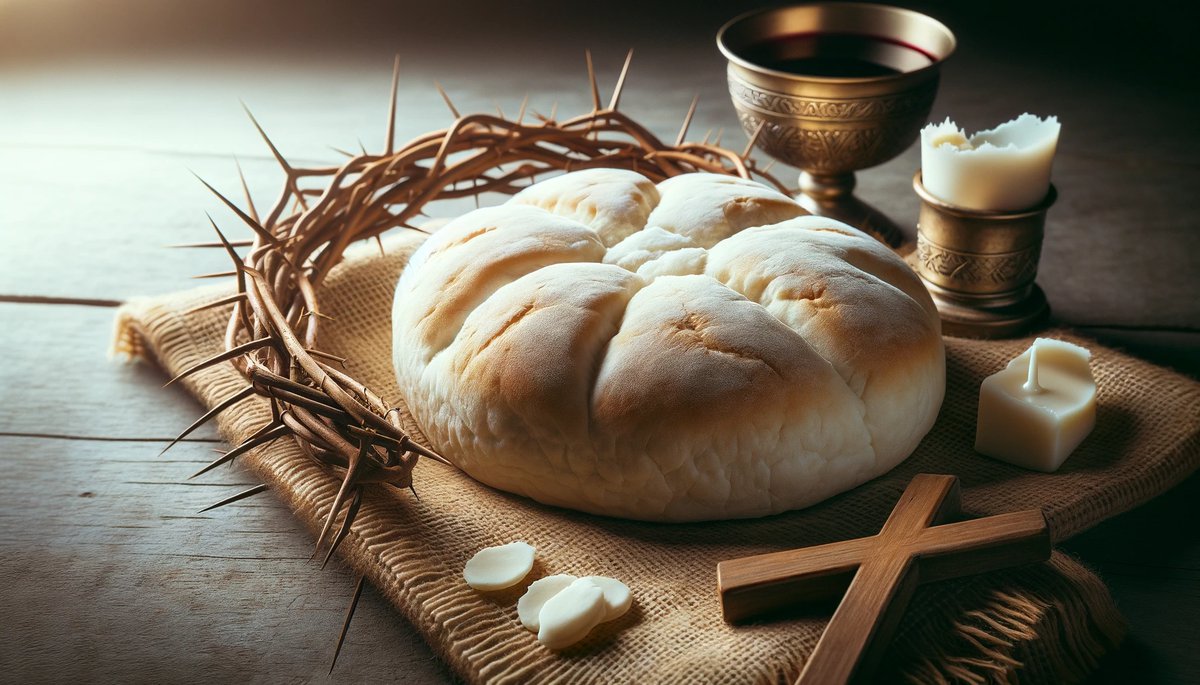Home>Theology and Spirituality>Why Communion Every Week


Theology and Spirituality
Why Communion Every Week
Published: February 24, 2024
Ericka Andersen, an editor at Christian.net, expertly merges digital strategy with content creation, focusing on faith and societal issues. Her communication skills enhance the platform's engaging narratives, fostering meaningful dialogue on belief's impact on society.
Discover the significance of weekly communion in theology and spirituality. Explore the reasons behind the practice and its impact on faith and community.
(Many of the links in this article redirect to a specific reviewed product. Your purchase of these products through affiliate links helps to generate commission for Christian.net, at no extra cost. Learn more)
Table of Contents
Introduction
Communion, also known as the Eucharist or the Lord's Supper, holds a central place in Christian worship and theology. It is a sacred ritual that symbolizes the body and blood of Jesus Christ and serves as a profound expression of faith and unity within the Christian community. The act of partaking in communion is deeply rooted in the teachings of Jesus Christ and has been practiced by believers for centuries.
The significance of communion extends far beyond its physical elements of bread and wine. It is a spiritual practice that serves as a powerful reminder of Christ's sacrifice on the cross and the redemptive grace that flows from this ultimate act of love. As Christians partake in communion, they are invited to reflect on the profound meaning of Christ's sacrifice and to renew their commitment to living in accordance with His teachings.
Throughout history, the frequency of communion has varied among different Christian denominations and traditions. While some churches observe communion on a weekly basis, others may do so monthly or even less frequently. The decision regarding the frequency of communion is often influenced by theological perspectives, historical practices, and practical considerations within each faith community.
In this article, we will explore the historical background of communion, delve into the significance of this sacred practice in the Christian faith, and examine the benefits of having communion every week. Additionally, we will address common concerns about weekly communion and provide practical tips for implementing this practice in a church community. By delving into these aspects, we aim to shed light on the profound spiritual and communal significance of weekly communion and its potential to enrich the faith experience of believers.
Historical background of communion
The historical roots of communion can be traced back to the Last Supper, a significant event in the life of Jesus Christ. According to the Gospels of Matthew, Mark, and Luke, Jesus shared a final meal with his disciples before his crucifixion. During this meal, he took bread, blessed it, broke it, and gave it to his disciples, saying, "Take, eat; this is my body." He then took a cup of wine, gave thanks, and offered it to his disciples, declaring, "Drink from it, all of you; for this is my blood of the covenant, which is poured out for many for the forgiveness of sins."
This symbolic act of sharing bread and wine with his disciples laid the foundation for the ritual of communion. It signified the impending sacrifice of Jesus' body and blood for the redemption of humanity. The early Christian community, deeply influenced by the teachings and actions of Jesus, incorporated this sacred meal into their worship practices.
The Apostle Paul, in his first letter to the Corinthians, provided further insight into the significance of communion. He recounted the events of the Last Supper and emphasized the spiritual unity and remembrance of Christ's sacrifice that communion represents. Paul's writings contributed to the theological understanding of communion as a means of proclaiming the Lord's death until his return.
As the early Christian church evolved, the practice of communion became an integral part of its worship and communal life. The term "Eucharist," derived from the Greek word for thanksgiving, came to be associated with this sacred meal, reflecting the spirit of gratitude and remembrance that characterized the ritual.
Throughout the centuries, various traditions and interpretations of communion emerged within the diverse landscape of Christianity. The theological nuances surrounding the nature of Christ's presence in the bread and wine, the understanding of the atoning significance of the Eucharist, and the frequency of its observance contributed to the rich tapestry of communion practices across different denominations.
The historical background of communion underscores its deep connection to the life and teachings of Jesus Christ and its enduring significance as a central sacrament in the Christian faith. This historical foundation provides a compelling backdrop for understanding the spiritual and communal dimensions of communion and its continued relevance in contemporary Christian worship.
The significance of communion in the Christian faith
Communion holds profound significance in the Christian faith, serving as a sacred and transformative practice that embodies the core tenets of Christian belief. At its essence, communion represents a spiritual communion with Jesus Christ, a remembrance of His sacrificial death, and a celebration of the redemptive grace that flows from this ultimate act of love.
First and foremost, communion is a symbolic reenactment of the Last Supper, where Jesus shared bread and wine with His disciples, instructing them to partake in remembrance of Him. This act of sharing a communal meal underscores the themes of unity, fellowship, and the establishment of a spiritual bond among believers. It serves as a tangible expression of the shared faith and shared identity of the Christian community, transcending individual experiences to unite believers in a collective remembrance of Christ's sacrifice.
Furthermore, communion embodies the concept of spiritual nourishment. Just as physical nourishment sustains the body, partaking in the bread and wine during communion symbolizes the spiritual sustenance that believers receive through their relationship with Christ. The act of consuming the elements signifies an intimate connection with Christ, signifying the spiritual nourishment and sustenance that believers receive through their relationship with Christ.
Moreover, communion serves as a powerful expression of gratitude and thanksgiving. The term "Eucharist," derived from the Greek word for thanksgiving, encapsulates the spirit of gratitude that permeates the communion ritual. Through partaking in communion, believers express gratitude for the sacrificial love of Christ and the redemptive grace extended to humanity. This act of thanksgiving fosters a deep sense of appreciation for the profound gift of salvation, reinforcing the central role of gratitude in the Christian life.
Additionally, communion serves as a proclamation of faith. By partaking in the ritual, believers publicly declare their allegiance to Christ and their participation in the new covenant established through His sacrifice. This public declaration of faith underscores the transformative power of communion, as believers reaffirm their commitment to living in accordance with the teachings and example of Jesus Christ.
In essence, the significance of communion in the Christian faith encompasses themes of unity, spiritual nourishment, gratitude, and proclamation of faith. It stands as a timeless and sacred practice that encapsulates the core beliefs and values of the Christian tradition, inviting believers to partake in a profound spiritual journey of remembrance, gratitude, and communal fellowship.
Benefits of having communion every week
Having communion every week offers a myriad of spiritual, communal, and transformative benefits for believers within the Christian community. This frequent observance of the Eucharist fosters a deeper connection to the core tenets of the Christian faith and enriches the worship experience in profound ways.
1. Spiritual Nourishment and Renewal
Weekly communion provides believers with regular opportunities for spiritual nourishment and renewal. By partaking in the symbolic elements of bread and wine, individuals are invited to engage in a reflective and contemplative practice that renews their connection to the redemptive message of Christ's sacrifice. This consistent spiritual nourishment serves to sustain and strengthen believers in their faith journey, offering a source of solace, inspiration, and renewal on a regular basis.
Read more: When Is The First Week Of Advent
2. Communal Unity and Fellowship
Frequent communion fosters a sense of communal unity and fellowship within the church community. Gathering together each week to partake in the Eucharist reinforces the shared identity and faith of believers, creating a space for communal bonding and mutual support. The act of coming together to share in the sacred meal serves to strengthen the bonds of fellowship, promoting a sense of belonging and interconnectedness among members of the church.
3. Continual Remembrance and Reflection
Weekly communion provides an ongoing opportunity for continual remembrance and reflection on the significance of Christ's sacrifice. By observing the Eucharist on a regular basis, believers engage in a consistent practice of remembrance, allowing the profound message of Christ's redemptive love to permeate their hearts and minds. This continual reflection deepens their understanding of the spiritual significance of communion and reinforces its transformative impact on their lives.
4. Encouragement of Spiritual Disciplines
The regular observance of communion encourages the cultivation of spiritual disciplines among believers. It prompts individuals to engage in self-examination, repentance, and a renewed commitment to living in accordance with the teachings of Jesus Christ. This practice of introspection and spiritual discipline fosters personal growth and transformation, nurturing a deeper sense of spiritual maturity and devotion among the faithful.
5. Integration of Communion into Worship Rhythms
Weekly communion seamlessly integrates the Eucharist into the rhythms of worship, allowing it to occupy a central place in the church's liturgical life. This consistent observance of communion reinforces its significance as a foundational practice within the worship experience, ensuring that it remains a focal point of spiritual devotion and communal expression within the church community.
In essence, the benefits of having communion every week encompass spiritual nourishment, communal unity, continual remembrance, encouragement of spiritual disciplines, and the seamless integration of communion into the fabric of worship. This frequent observance of the Eucharist serves to enrich the spiritual lives of believers and deepen their connection to the transformative message of Christ's sacrifice.
Read more: Why Closed Communion
Addressing common concerns about weekly communion
Some common concerns may arise when considering the transition to weekly communion within a church community. Addressing these concerns is essential in fostering a clear understanding of the implications and benefits of this practice.
1. Overemphasis on Ritual
One concern often raised is the potential for an overemphasis on the ritualistic aspect of communion, leading to a sense of routine rather than genuine spiritual engagement. To address this, it is crucial to emphasize the significance of intentional and reflective participation in the Eucharist. Encouraging congregants to approach communion with a mindset of reverence, gratitude, and spiritual receptivity can mitigate the risk of ritualistic complacency.
2. Practical Considerations
Practical concerns, such as the logistics of preparing the elements, coordinating volunteers, and managing the flow of the service, may arise when contemplating weekly communion. Addressing these practical considerations involves careful planning and organization. Establishing a structured framework for the preparation and administration of communion, along with clear communication and volunteer support, can alleviate logistical challenges and ensure the smooth implementation of weekly observance.
3. Theological Understanding
Questions regarding the theological implications of frequent communion may surface, particularly concerning the nature of Christ's presence in the Eucharist and the interpretation of the sacramental act. Providing opportunities for theological education and open dialogue can help address these concerns. Engaging in thoughtful discussions, study groups, and teachings on the theological foundations of communion can enrich congregants' understanding and foster a deeper appreciation for the spiritual significance of weekly observance.
Read more: Why Is It Called Communion
4. Reverence and Sanctity
Concerns about maintaining the reverence and sanctity of the communion ritual in the context of frequent observance are valid. Emphasizing the sacred nature of the Eucharist and the need for a reverent approach can help mitigate these concerns. Cultivating a culture of reverence through intentional worship practices, moments of silence, and pastoral guidance can uphold the sanctity of communion while embracing its more frequent celebration.
5. Inclusivity and Participation
Ensuring inclusivity and active participation in weekly communion is essential. Addressing concerns related to accessibility, understanding, and the involvement of diverse congregants is paramount. Implementing measures to accommodate varying needs, providing educational resources, and fostering a sense of belonging for all members of the community can promote a more inclusive and participatory experience of weekly communion.
By addressing these common concerns with thoughtful consideration, intentional guidance, and a spirit of openness, church leaders and congregants can navigate the transition to weekly communion with clarity, unity, and a deepened sense of spiritual purpose.
Practical tips for implementing weekly communion in a church community
Implementing weekly communion in a church community requires thoughtful planning, clear communication, and a commitment to fostering a meaningful and reverent experience for congregants. Here are practical tips to guide the successful implementation of weekly communion:
-
Establish a Leadership Team: Form a dedicated leadership team responsible for overseeing the logistics, preparation, and execution of weekly communion. This team can consist of clergy, church staff, and volunteers who are committed to upholding the sacred nature of the Eucharist.
-
Liturgical Preparation: Develop a structured liturgical framework for the weekly observance of communion. This includes crafting meaningful prayers, selecting appropriate hymns or worship songs, and integrating relevant scripture readings that align with the themes of remembrance, gratitude, and unity.
-
Volunteer Coordination: Recruit and organize volunteers to assist with the preparation of communion elements, serving during the service, and cleanup afterward. Clearly communicate roles and responsibilities to ensure a smooth and reverent execution of the Eucharist.
-
Educational Resources: Provide educational resources to help congregants understand the theological significance and spiritual depth of weekly communion. This can include sermon series, study guides, or informational sessions that delve into the historical, biblical, and theological foundations of the Eucharist.
-
Pastoral Guidance: Offer pastoral guidance and support to congregants as they navigate the transition to weekly communion. Address any concerns, questions, or theological inquiries with empathy and clarity, fostering a sense of unity and understanding within the church community.
-
Accessibility and Inclusivity: Ensure that weekly communion is accessible to all members of the congregation. Accommodate individuals with dietary restrictions or special needs, and create an inclusive environment where everyone feels welcome to participate in this sacred practice.
-
Communication and Transparency: Clearly communicate the decision to transition to weekly communion, outlining the reasons behind this shift and the spiritual benefits it offers. Invite feedback and open dialogue to foster a sense of communal ownership and understanding.
-
Evaluation and Adaptation: Regularly evaluate the impact of weekly communion on the church community. Solicit feedback from congregants and assess how this practice is enriching their spiritual lives. Be open to adaptation and refinement based on the evolving needs and dynamics of the congregation.
By implementing these practical tips, a church community can navigate the transition to weekly communion with intentionality, reverence, and a shared commitment to nurturing a spiritually enriching worship experience for all participants.
Conclusion
In conclusion, the practice of weekly communion holds profound significance in the life of a Christian community. It serves as a powerful means of spiritual nourishment, communal unity, and continual remembrance of Christ's sacrifice. The historical roots of communion, dating back to the Last Supper and the early Christian church, underscore its enduring relevance as a central sacrament in the Christian faith.
By partaking in communion every week, believers engage in a transformative journey of spiritual renewal, communal fellowship, and deepened understanding of the redemptive message of Christ's sacrifice. The benefits of weekly communion extend beyond the ritualistic aspect, encompassing spiritual nourishment, communal unity, and the integration of the Eucharist into the fabric of worship.
Addressing common concerns about weekly communion, such as overemphasis on ritual, practical considerations, theological understanding, reverence, and inclusivity, is essential in fostering a clear understanding of the implications and benefits of this practice. By approaching these concerns with thoughtful consideration and intentional guidance, church communities can navigate the transition to weekly communion with clarity and unity.
Practical tips for implementing weekly communion, including establishing a leadership team, liturgical preparation, volunteer coordination, educational resources, pastoral guidance, accessibility, inclusivity, communication, and evaluation, provide a roadmap for successfully integrating this practice into the worship experience.
Ultimately, the decision to embrace weekly communion reflects a commitment to nurturing a spiritually enriching environment where believers can continually draw strength, unity, and inspiration from the profound message of Christ's sacrifice. As church communities embark on this journey, they are poised to experience the transformative power of weekly communion, fostering a deeper sense of spiritual connectedness and communal devotion.
In embracing the practice of weekly communion, church communities affirm their dedication to upholding the sacred tradition of the Eucharist, fostering a culture of gratitude, remembrance, and unity that resonates deeply with the core values of the Christian faith. Through this intentional observance, believers are invited to partake in a sacred journey of spiritual renewal, communal fellowship, and continual remembrance, enriching their faith experience and deepening their connection to the transformative message of Christ's sacrifice.












